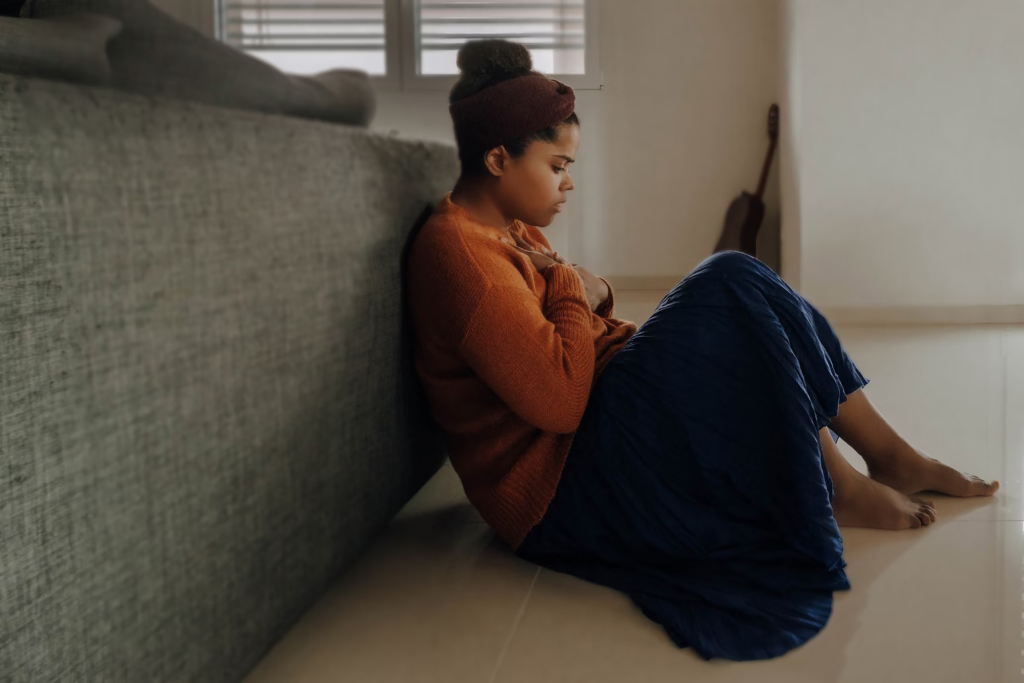Introduction
Anxiety has become an increasingly common experience, impacting millions of people worldwide. Whether it’s triggered by work pressures, personal responsibilities, or simply the unpredictable nature of everyday life, anxiety can feel overwhelming. However, there are practical and effective ways to manage these feelings. If you’re Struggling with Anxiety, these simple coping strategies can help you regain a sense of calm and control. From mindfulness techniques to lifestyle adjustments, these tips are designed to be easy to implement and adaptable to your needs.

1. Practice Deep Breathing to Calm Your Mind
One of the quickest and most effective ways to reduce anxiety is by practicing deep breathing. When you’re anxious, your body’s fight-or-flight response is triggered, leading to rapid, shallow breathing. This, in turn, can increase feelings of panic and make it difficult to think clearly. Deep breathing helps counteract this response by sending a signal to your brain to relax.
How to Practice Deep Breathing:
- Find a Quiet Place: Sit or lie down comfortably.
- Inhale Slowly Through Your Nose: Count to four as you breathe in.
- Hold Your Breath for Four Seconds: Let the oxygen fill your lungs.
- Exhale Slowly Through Your Mouth: Breathe out for a count of six, letting your shoulders drop and your body relax.
A study published in the Journal of Psychiatric Research found that deep breathing techniques can significantly reduce anxiety levels and improve overall mental health (Journal of Psychiatric Research, 2017).
2. Get Moving: Physical Exercise as an Anxiety Reducer
Exercise isn’t just for physical fitness—it’s a powerful tool for managing anxiety as well. Regular physical activity boosts the production of endorphins, which are natural mood enhancers, and reduces levels of the stress hormone cortisol. Even a short, brisk walk can help alleviate feelings of anxiety and improve your overall sense of well-being.
Effective Exercises for Anxiety Relief:
- Brisk Walking or Jogging: Just 15-30 minutes can make a difference.
- Yoga and Stretching: Combines physical movement with deep breathing for a dual benefit.
- Strength Training: Helps focus your mind and reduce pent-up stress.
Research published in the Journal of Anxiety Disorders shows that individuals who engage in regular physical exercise experience a 20% reduction in anxiety symptoms compared to those who remain sedentary (Journal of Anxiety Disorders, 2018).
3. Try Progressive Muscle Relaxation (PMR)
Progressive Muscle Relaxation (PMR) is a technique that involves tensing and then slowly releasing different muscle groups in your body. This process helps release physical tension, which can contribute to anxiety. By focusing on each muscle group, you also divert your attention away from anxious thoughts and towards a calming physical sensation.
How to Do Progressive Muscle Relaxation:
- Start at Your Feet: Tense the muscles in your feet and hold for five seconds, then release.
- Move Up Your Body: Progressively tense and release each muscle group—calves, thighs, abdomen, chest, arms, and face.
- Focus on the Difference: Notice the contrast between tension and relaxation in each group.
The American Psychological Association notes that PMR has been shown to reduce anxiety and improve emotional well-being, making it a simple yet effective tool for stress management (American Psychological Association, 2019).
4. Limit Your Caffeine and Sugar Intake
What you consume can significantly impact your anxiety levels. While it’s tempting to reach for a cup of coffee or a sugary snack when you’re feeling drained, these substances can exacerbate anxiety. Caffeine is a stimulant that can increase heart rate and trigger anxiety-like symptoms, while sugar can cause spikes and crashes in blood sugar, leading to irritability and anxiety.
Tips for Reducing Caffeine and Sugar:
- Opt for Herbal Teas: Chamomile or peppermint tea can promote relaxation.
- Choose Whole Foods: Instead of sugary snacks, opt for fruits, nuts, or yogurt.
- Gradually Decrease Caffeine Intake: Reducing caffeine slowly can help prevent withdrawal symptoms.
A report from the Journal of Nutrition and Health Sciences found that high caffeine and sugar consumption is linked to increased anxiety levels, especially in individuals already prone to anxiety disorders (Journal of Nutrition and Health Sciences, 2020).
5. Practice Mindfulness Meditation
Mindfulness meditation involves focusing on the present moment and accepting it without judgment. This practice can help reduce anxiety by interrupting negative thought patterns and promoting a sense of calm. It’s also been shown to decrease activity in the brain’s anxiety-related regions, making it an excellent long-term strategy for managing anxiety. It’s one of a simple coping strategies for anxiety.
How to Practice Mindfulness:
- Set Aside 5-10 Minutes Daily: Find a quiet space to sit comfortably.
- Focus on Your Breathing: Notice each inhale and exhale, bringing your attention back whenever your mind wanders.
- Observe Your Thoughts: Allow thoughts to pass without engaging or judging them.
The Journal of Clinical Psychology found that people who practiced mindfulness meditation daily for eight weeks experienced a 30% reduction in anxiety levels compared to those who did not practice (Journal of Clinical Psychology, 2019).
6. Establish a Healthy Sleep Routine
Lack of sleep can significantly worsen anxiety symptoms, creating a vicious cycle that’s hard to break. Establishing a consistent sleep routine can help regulate your mood, reduce stress, and improve your overall resilience to anxiety.
Tips for Better Sleep:
- Create a Wind-Down Routine: Read a book, take a warm bath, or practice light stretching before bed.
- Limit Screen Time: Avoid screens at least an hour before sleep to reduce blue light exposure.
- Stick to a Schedule: Go to bed and wake up at the same time every day, even on weekends.
According to a review by the National Sleep Foundation, adults who establish regular sleep routines report lower levels of anxiety and depression compared to those with irregular sleep patterns (National Sleep Foundation, 2021).
7. Stay Connected: Talk to Friends and Family
Social support plays a crucial role in managing anxiety. Talking to friends or family members can provide emotional support, new perspectives, and practical solutions for managing anxiety. Simply expressing your feelings to someone you trust can reduce the intensity of anxious thoughts. It’s one of a simple coping strategies for anxiety.
How to Build a Support System:
- Schedule Regular Check-Ins: Make time for coffee dates or phone calls.
- Join Support Groups: Consider finding an online or in-person support group for anxiety.
- Be Honest About How You Feel: Authentic conversations can deepen relationships and reduce feelings of isolation.
The Journal of Social and Clinical Psychology found that individuals with strong social support networks are 50% less likely to experience severe anxiety symptoms (Journal of Social and Clinical Psychology, 2020).
Conclusion
Anxiety is a challenging but manageable condition. By incorporating these Simple Coping Strategies for Anxiety, you can build a toolkit to help you navigate overwhelming moments and find more peace in your daily life. Whether it’s practicing deep breathing, limiting caffeine, or engaging in mindfulness meditation, small changes can lead to big improvements over time. Remember that anxiety management is a journey, and the key is to find what works best for you.
References
- Journal of Psychiatric Research. (2017). “Impact of Deep Breathing on Anxiety.” Journal of Psychiatric Research.
- Journal of Anxiety Disorders. (2018). “Exercise and Anxiety: The Link.” Journal of Anxiety Disorders.
- American Psychological Association. (2019). “The Benefits of Progressive Muscle Relaxation.” American Psychological Association.
- Journal of Nutrition and Health Sciences. (2020). “Diet and Its Role in Anxiety.” Journal of Nutrition and Health Sciences.
- Journal of Clinical Psychology. (2019). “Mindfulness Meditation for Anxiety Reduction.” Journal of Clinical Psychology.
- National Sleep Foundation. (2021). “The Importance of Sleep in Managing Anxiety.” National Sleep Foundation.
- Journal of Social and Clinical Psychology. (2020). “The Role of Social Support in Managing Anxiety.” Journal of Social and Clinical Psychology.









